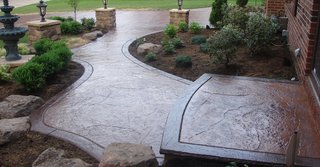Concrete Driveways Are A Solid Choice
Wiki Article
Whether you'll want to install a driveway on a new home, or you have to replace your present driveway, you've been probably wondering which material is better. I am sure you have done a little homework and know the three common materials used in construction, however are you alert to the benefits and conditions are connected with each? Depending on your financial budget, tolerance for maintenance, and climate you should consider each driveway material carefully.

Concrete driveways, asphalt driveways, and brick or pavers will be the three most common forms of residential driveways. If your first concern may be the cost you'll be able to always choose to use gravel. But if you live in a suburban community, that you will find to install one of many other three types.
Asphalt driveways are less costly than concrete and pavers. When finances are a primary concern, many homeowners choose to use asphalt. Asphalt driveways typically last around 20 years and might be resurfaced. Repairs may also be easy to make. Asphalt driveways do present some problems though. They are not as durable like a concrete driveway, they can get softer in high heat climates, and they must be resealed every three to five years.
Driveways made of pavers or bricks are extremely beautiful. However, their beauty comes with an exorbitant asking price. Paver driveways will be more durable than asphalt driveways however they too have a few downfalls. Price is normally the reason homeowners choose not to use bricks or pavers inside their driveway construction. Also, in extreme cold and freezing, water could possibly get in the seams between the masonry and cause cracking or breaking. If the driveway was poorly installed, it may well start to warp and weeds can start to grow between the bricks.
Concrete driveways tend to be expensive than asphalt, but less costly than brick driveways. Concrete is really a popular choice among homeowners for several reasons. First of all they are really durable and require hardly any maintenance. When installed properly and sealed occasionally, they can last over 50 years. Concrete can provide homeowners with more versatile design choices.
For example, concrete might be either stained, painted, or have color put into them when they are installed. This allows homeowners to really get creative using concrete retaining walls. Another benefit is that it can also be stamped. This means that design patterns including bricks or stone could be stamped in the wet concrete before it dries. Once it's dried, a stamped concrete driveway may offer the look of a paver or stone driveway cheaper. Concrete does have a couple of issues though. They may also be susceptible to cracking in cold temperatures, can stain easy, and may be expensive to mend. That being said, concrete provide the most durable and versatile solution.